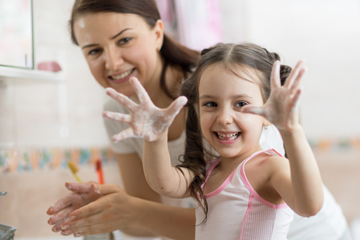Many diseases and infections are spread by not washing hands. That’s why it’s important to make hand hygiene a part of your daily routine. Every year, the first week of December is observed as National Hand Washing Awareness Week. This year, National Hand Washing Awareness Week is from December 2-8. Sponsored by the Henry the Hand Foundation, National Hand Washing Awareness Week was initiated by Dr Will Sawyer, a family physician and infection control specialist. Dr. Sawyer’s Henry the Hand Foundation is endorsed by the American Medical Association and the American Academy of Family Physicians.
As we observe National Hand Washing Awareness Week, it’s important to understand why hand hygiene is important and how to do it properly.
Touching your eyes with your hands causes the bacteria in your hands to get into the eyes. According to Alsco, experts say that 80% of infectious respiratory diseases like colds and flu are due to dirty hands. Hand washing with soap gets rid of germs from hands and reduces the risk of these illnesses and the spread of infections to others.
Diseases and infections spread by hands that are dirty include mild conditions, such as the common cold, as well as severe or life-threatening diseases. According to the Clean the World Foundation, data from UNICEF shows that more than 1.4 million children under age five die from diarrhea and pneumonia, which is more than AIDS, malaria and tuberculosis combined. Just hand washing (using soap) can reduce death rates from these diseases up to 65% (www.sandoz.com). Clean hands can save lives. One of the best ways to avoid spreading germs and maintain hand hygiene is by washing hands using soap and clean, running water.
The Henry the Hand Foundation is a non-profit (501c3) organization focused on promoting the 4 principles of hand awareness:
- Wash your hands when they are dirty and before eating
- Do not cough into your hands
- Do not sneeze into your hands
- Above all, do not put your fingers into your eyes, nose, or mouth
The foundation has created a behavior change program that uses Positive Deviance Strategy to train both children and adults on hand hygiene. They also offer Infection Prevention Tool Kits for Early Childhood, Pre-schools, Classrooms, Schools, Home, Hospitals and a Community Service Tool Kit for older students to teach the youngsters.
According to the Centers for Disease Control and Prevention (CDC), hand washing is one of the best ways to protect yourself and your family from getting sick. The CDC recommends washing your hands: before, during, and after preparing food, before eating food, before and after caring for someone who is sick, before and after treating a cut or wound, after using the toilet, after changing diapers or cleaning up a child who has used the toilet, after blowing your nose, coughing, or sneezing, after touching an animal, animal feed, or animal waste, after handling pet food or pet treats, and after touching garbage.
Though bacteria exist everywhere, cleaning office equipment with an alcohol-based cleaning product can decrease the amount of bacteria on them. Also wash your hands frequently to prevent passing bacteria all around the office.
Washing with soap and water is the best way to reduce the number of microbes on your hands. If soap and water are not available, use an alcohol-based hand sanitizer that contains at least 60% alcohol. However, while alcohol-based hand sanitizers can quickly reduce the number of germs on hands in some situations, they do not eliminate all types of germs and might not remove harmful chemicals.
Celebrate National Hand Washing Awareness Week – Make a habit of good hand hygiene and spread the word about this healthy practice!
